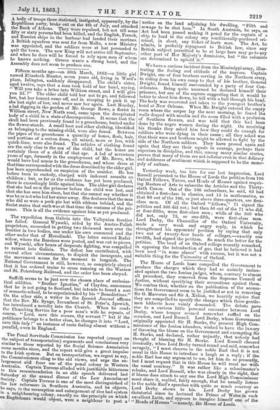The House of Lords have compelled the Government to produce
the charges which they had so unfairly insinu- ated against the two Ionian judges, whom, contrary to almost all precedent, they removed from the Supreme Council of Justice, without specifying their accusations against them. We confess that, whether on the publication of the accusa- tions the Government seem to be justified or not in removing Sir G. Marcoran and Sir A. Xidian, we heartily rejoice that they are compelled to specify the charges which these gentle- men hitherto have vainly demanded. The debate gave rise to a curious little personal encounter between Lord Derby, whose temper seemed somewhat ruffled on the occasion, and Lord Russell. Lord Derby, whose Government originally appointed Sir H. Storks, the present High Com- missioner of the Ionian islanders, wished to have the luxury of throwing the blame on the Government and exempting Sir H. Storks, and declared, rather unjustly, that nobody had thought of blaming Sir H. Storks. Lord Russell cheered ironically, when Lord Derby turned round and said, somewhat savagely, "I must observe to the noble Earl that it is not usual in this House to introduce a laugh as a reply ; if the noble Earl has any argument to use, let him do so presently, but I must request that in this House he will treat me with the usual courtesy." It was rather like a schoolmaster's rebuke, and Lord Russell, who was clearly in the right, that if blame does attach to any one the Lord High Commissioner must share it, replied, fairly enough, that he usually listens to the noble Earl's speeches with quite as much courtesy as Lord Derby shows to his. Lord Derby has grown dictatorial since he lectured the Prince of Wales in such excellent Latin, and appears to imagine himself one of the "Heads of Houses "—namely, the House of Lords.



































 Previous page
Previous page